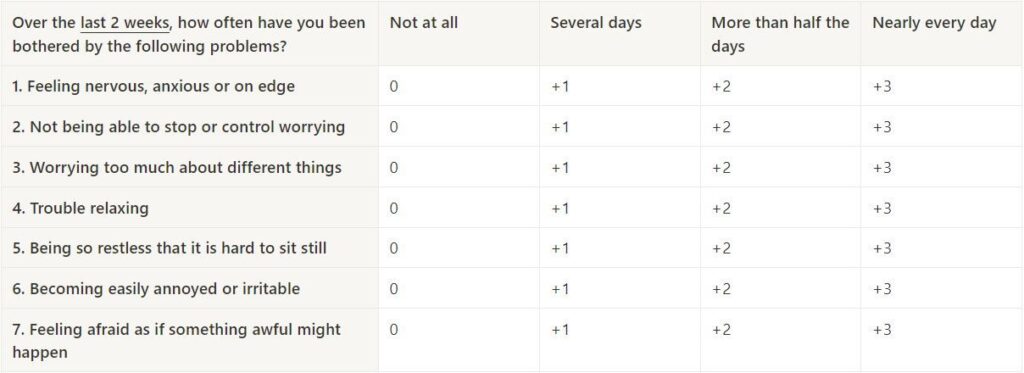Have your progress notes written for you automatically
The GAD-7 is a user-friendly, self-administered questionnaire for screening and measuring generalized anxiety disorder severity.
The Generalized Anxiety Disorder 7-Item Questionnaire (GAD-7)

The GAD-7 score is obtained by adding the scores for each of the 7 questions (total points) (range: 0-21)
Scoring & Interpretation
Now that you’ve completed the GAD-7 questionnaire, it’s important to understand what your results actually mean.
Each question is scored 0-3 based on how frequently you experienced symptoms. Add up the totals to get your overall score.
Score Ranges:
- 0-4 = Minimal anxiety
- 5-9 = Mild anxiety
- 10-14 = Moderate anxiety
- 15-21 = Severe anxiety
Higher scores indicate greater levels of distress from anxiety symptoms. But scores alone don’t determine a diagnosis – they simply provide insight into severity.
Performance of GAD-7 as Screening Tool for Anxiety Disorders

GAD-7 Recommendations
- 0-4 = Minimal anxiety: No follow-up is warranted unless symptoms/scores change
- 5-9 = Mild anxiety: Re-take the GAD-7 to monitor for symptoms for 4 weeks. Follow up with a mental health professional as indicated.
- 10-14 = Moderate anxiety: Based on the information provided, this individual seems to be experiencing symptoms consistent with an anxiety disorder. Need for further professional evaluation
- 15-21 = Severe anxiety: symptoms likely warrant active treatment and monitoring with a mental health professional.
GAD-7 Pearls & Pitfalls
- Applicability: It can effectively screen for the four most prevalent anxiety disorders: Generalized Anxiety Disorder, Panic Disorder, Social Anxiety Disorder, and PTSD.
- Accuracy: The GAD-7 demonstrates 70-90% sensitivity and 80-90% specificity across disorders when using recommended clinical cut-off scores.
- Correlation to Severity: Higher scores on the GAD-7 correlate with greater levels of disability, distress and impairment in important daily functioning areas like work productivity and health care utilization.
- Clinical Utility: It serves as both an initial screening tool to identify likely cases as well as a continuous measure of symptom severity. This allows monitoring treatment progress over time.
- Validation: Extensive validation research has demonstrated the GAD-7 reliably differentiates anxiety disorder cases from non-cases and corresponds well with established diagnostic criteria and gold-standard clinical interviews.
- Effectiveness: When utilized as directed, the GAD-7 performs well across diverse settings like primary care, community mental health and specialized anxiety clinics.
GAD-7 vs. PHQ-9
When comparing the GAD-7 and PHQ-9 assessments, we find two valuable tools that aid in evaluating mental health conditions. The GAD-7 focuses specifically on measuring the severity of generalized anxiety disorder (GAD), while the PHQ-9 targets depressive symptoms. While both assessments use a similar format, with individuals rating the frequency and intensity of their symptoms over a specific timeframe, their primary focus differs. The GAD-7 hones in on anxiety-related symptoms, while the PHQ-9 delves into depressive symptoms. These assessments serve as valuable resources for clinicians to gain a comprehensive understanding of their clients’ mental health and provide tailored interventions to address their specific needs.
Screening for GAD Using the GAD-7 Tool: Suitability
The GAD-7 is a brief, 7-item questionnaire that can help determine if your worries and physical symptoms are crossing over into a clinical disorder.
Taking just 1-2 minutes to complete, it assesses how often over the past two weeks you’ve experienced core anxiety symptoms.
Validated for diverse populations, the GAD-7 is a reliable first step toward clarification and treatment.
When to Use the GAD-7?
The GAD-7 can be a valuable tool in both screening for anxiety disorders and monitoring treatment progress over time.
A. Screening
The brief 1-2 minute assessment makes the GAD-7 well-suited for initial anxiety screening in outpatient settings like primary care offices. It can provide a fast indication of whether clinically significant symptoms of GAD, panic disorder, social anxiety, or PTSD may be present.
B. Monitoring Treatment Progress
For those receiving therapy for an anxiety condition, the GAD-7 allows easy tracking of symptom improvement. By re-taking the questionnaire periodically, both patients and providers can gauge treatment effectiveness. It highlights what coping techniques or medication adjustments may be helping – or areas still needing more focus.
C. Self-Reflection Tool
On a personal level, the GAD-7 can promote self-reflection. Seeing how symptom severity may fluctuate over time helps individuals better understand their own anxiety experiences, triggers, and coping abilities. It fosters more open discussion with providers too.
Getting a Proper Diagnosis
While screening tools provide useful insight, only a medical professional can confirm a GAD diagnosis through a full evaluation.
A mental health professional will consider not only your symptoms but also potential underlying causes or co-occurring conditions.
Getting an official diagnosis opens the door to tailored treatment plans and community support resources.
References:
- American Psychiatric Association. (1994). Diagnostic and statistical manual of mental disorders (4th ed.).








